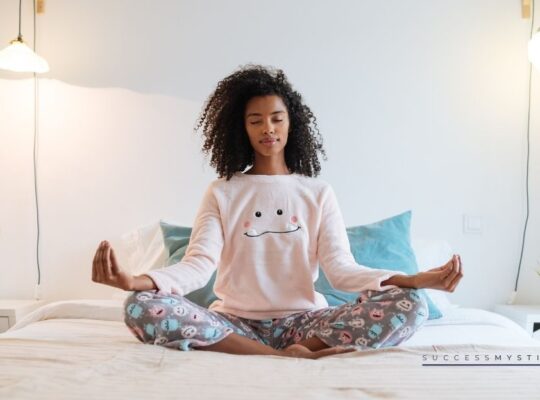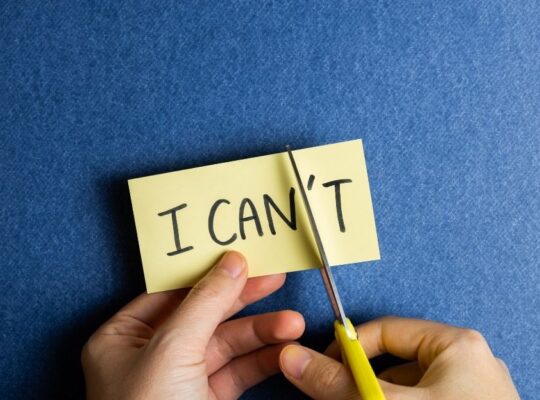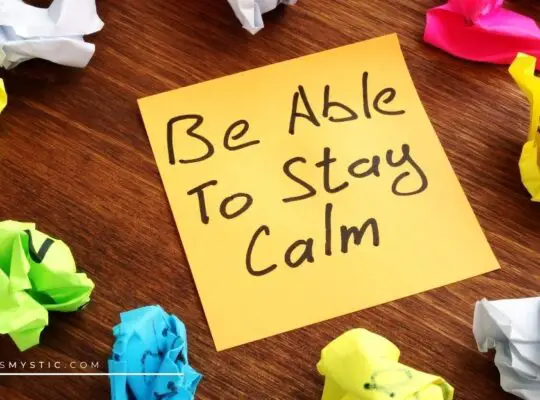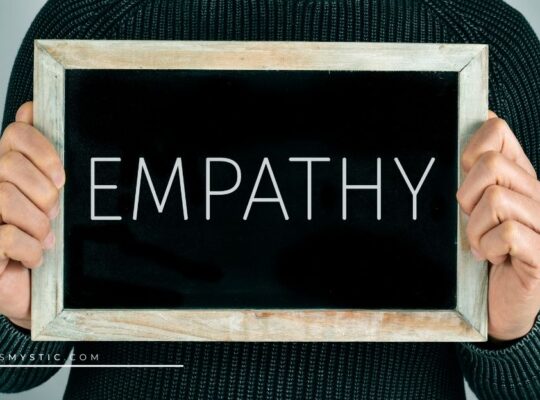In this article: It’s time to finally feel good about your body and the image you see in the mirror…
Nine out of 10 women over the age of 50 struggle with body confidence and low self-esteem. These struggles keep them from participating in various areas of their life including fitness and outdoor activities.
Many will go out of their way to avoid being seen in daylight doing anything that draws attention to the body from going to the grocery store to exercising in public, according to an article published in Mental Health Nursing. Others hide beneath the cloak of baggy clothing to hide curves they deem as being unsightly or embarrassing.
What is the source of these feelings and how can we learn to improve our body confidence levels? Let’s take a closer look at the meaning of body image.
What Is Body Image?
Body image is how we see ourselves when we look in the mirror. It’s what you see when you close your eyes and imagine a picture of yourself. Our concept of self may not be the same as how others see us. Our perception of self generally encompasses assumptions, memories, and generalizations according to National Eating Disorders.
Further, our height, body shape, and weight play a pivotal role in our unique vision of self. Also, we can zero in on our perception of how we physically move, act, or how it is we feel deep down inside of our body.
Our body image perceptions form at a very young age. What people say to us can have positive and negative consequences on our mental wellness and ultimately, may have a direct impact on our body image. Images of others that we see, including the Barbie doll according to one study from a very young age, can follow us into adulthood, distorting our image about what defines the perfect body.
Women especially have to endure pressure about their physical appearance, as the physical ideal of what is acceptable is often unrealistic for the average woman. Society, particularly Western culture’s preoccupation with thinner body frame standards are laden with messages that can prove disruptive to women’s mental health.
What Contributes to a Negative Body Image
According to WomensHealth.gov, negative body image is shaped by current and past experiences including but not limited to the following:
- Being overweight, underweight or obese
- Images or messages that appear on television, in magazines, online and social media that can generate negative feelings about one’s self
- Negative and disparaging remarks about your appearance including being told you are “ugly,” “fat,” “skinny” or some other aspect of your looks
- Gender. Adolescent girls are most susceptible to experiencing dissatisfaction with their bodies than boys
- Poor self-esteem
- Depression
- Bullying, taunting or teasing
- Family or friends who share their concerns about body image
Impact of Negative Body Image
Our body is vital to our physical and mental health. As time passes, negative feelings about your body image can have significant consequences. For example, a side effect of negative body image is that it can lead to unhealthy behaviors and attitudes.
According to Jacqueline Clode et al., these feelings may trigger symptoms of anxiety for women every time they come face to face with their reflection in the mirror. For some women, this may also lead to depression. Eating disorders are another condition that may emerge if body image distortion continues to be a problem.
A poor image self can lead to low self-esteem which will eventually transfer to other parts of your life, leading to isolating behaviors. Some people prefer to be alone rather than around others. Others may begin to practice obsessive behaviors such as worrying about what they eat, portion sizes, and exercise frequency.
According to a 2010 Girls’ Attitudes Survey indicated that 8 percent of girls ages seven to 11 years of age would prefer to be thinner. For girls ages 11 to 16 years of age, 21 percent of girls wish they could be thinner. Finally, for girls ages 16 to 21, 33 percent desire thinner frames.
The 2004 American Study by Presnell et al. indicated that 43 percent of females between the ages of 16 and 19 were not happy with their bodies despite being within a healthy and normal body mass index (BMI).
Statistically, girls have a higher rate of dissatisfaction with their bodies than do boys. Caucasian girls have a higher negative body image than African American or Hispanic girls according to WomensHealth.gov.
What do all of these stats say about negative body image? Many women perceive themselves as being fat. The feeling of being overweight is most likely to be the thing that most women see as it relates to their body image and these thoughts are a lot to carry around for the duration of your life. Some people develop body dysmorphic disorder or BDD, a condition that causes people to see a part or all of their body in a negatively. Some people will even seek cosmetic surgery to address the issue.
Negative body image may not only impact your personal life but can also transfer into your professional life. Preoccupation with one’s appearance can be distracting and affect overall workplace performance.
Also, work environments that have a primary focus in the way you look can also hurt your perception of image than the average workplace. Other work environments that continuously focus on weight control or dieting habits may also cause you to question the adequacy of your body.
What Does It Mean To Have Positive Body Image?
People who possess a positive body image commonly display positivity and vitality. They have a unique appreciation of diverse body shapes and what qualifies as beautiful. They are resilient and respect their body.
According to the Journal of Eating Disorders, those with a positive body image have self-awareness about body image, obsession behaviors and have the capacity to practice positivity and affirmations as a component of their self-care.
According to National Eating Disorders Collaboration, having a positive body image can:
Improve Self-Esteem
Self-esteem is how we feel about ourselves. It is how we define our worth or abilities in this world. Our self-esteem permeates every corner of our lives and has a considerable effect on our happiness and welfare. Good self-esteem provides you with the courage to undertake new opportunities. It motivates you to believe in yourself and to have the confidence to make better choices for your mind, body, and lifestyle.
Enhances Self-Acceptance
Self-acceptance is the ability to accept yourself wholly and unconditionally. These individuals are comfortable and satisfied with who they are and not impacted by what others think or media.
Positive Outlook and Behaviors
Positive body image enables you to feel positive about the future, and you can lead a life that has balance and a healthy attitude about your body.
23 Ways To Improve Your Body Image
How do you begin to improve your body image? The path to seeing yourself in a positive light does not start or end with a single tip. It’s a journey that will entail trial and error and on occasion, repetition to reap the rewards.
Studies show that taking action to “improve” the things that you perceive to not be optimal such as your weight if you are obese, can help to improve your body image, even with the smallest shift.
Here are a few additional tips to improve your body image and learn to love who it is you see in the mirror each day.
1| Practice Positive Thinking
Positive thinking is the best way to generate positive thoughts about yourself. Decreasing the volume of negative thoughts in your head will help to steer you in the right direction of finding your positive image of self. Create a mantra for yourself or better yet say these things to your reflection in the mirror:
- Thank you body for allowing mr to wake up and get out of bed today
- I love you, my body for being who you are
- My body is unique
- My favorite part of my body is______.
- Thank you body for letting me enjoy this day
- I take care of my body because it takes excellent care of me
Switching Your Mind To Positive Thinking
You should not minimize the impact positivity can have on your life. The moment you implement this lifestyle, it will make everything else a little bit easier.
Nonetheless, getting there is not easy, but the benefits are well worth the challenge. How can you flip the switch? Psychology Today suggests you can take the following steps:
Examine Your Current Way of Thinking
Do you think positively? If you aren’t quite sure if you are already following this philosophy, there are a variety of quizzes available to help you determine if you are already on the right path to improving your well-being or if you are going to have to make a considerable effort to arrive at this destination.
Reboot Your Memory with Positive Terminology
Improving your level of positivity may be as simple as changing your vocabulary. Positive words can reset the foundation of your positive benchmark. Forcing your brain to make a conscious effort to use positive words continually enables you to connect with the practice of positivity.
Empower Your Mind to Use Positive Information
Do you find yourself thrown for a loop when someone pays you a compliment? Sometimes this physical and emotional response has everything to do with your brain’s inability to manage positive information.
We have to make a concerted effort to train our mind to handle positive exchanges. Again, by familiarizing yourself with positive words and recalling what they are can help you to receive them from others better and give a positive response in kind rather than one of a dismissing nature.
Train Your Brain to Identify Positive Over Negative First
We are each guilty of zeroing in on the bad before we see the good in any given scenario or event. You have probably done it a million times. You go to a restaurant that is slow in seating you and completely miss out on the fact that later on, after receiving a perfect meal, you’re still fixated on the idea that it took a little too long to seat you.
Your brain is more than likely programmed only to see the negative. Instead of focusing on the negative, train your mind to look at the positive.
Consciously Pursue Random Moments of Positivity
You can condition yourself to enjoy random moments of positivity. It all starts with revisiting positive memories. Do you have a favorite meal or song that transports you back into time when you get the opportunity to be in its presence? You get warm feelings and a euphoric sense of nostalgia every time? These are positive experiences that we can revisit at any time despite the fact that it is now a different day.
Be Positive but Don’t Have Guilt if Negativity Emerges from Time to Time
Positivity has its advantages, but it may not always be appropriate at all times. Negativity does have merits, particularly if we are experiencing grief or anger. You do need to confront your emotions to get back to the other side of positivity.
Condition Yourself to Be Gracious
Look for opportunities to give thanks. The practice of gratitude entails expressing feelings of thanks for the people in our lives, the things we possess and our life experiences. Gratitude allows you to assign real meaning and highlights your satisfaction with various aspects of your life.
Enjoy the Good Times
Do not allow the good times to go unrecognized. Indulge in them and savor them as future memories. Enjoy those good emotions and the feeling you had as the various events within that moment took place. You can also try connecting those good feelings to similar events from the past which will help you create a long-lasting chain of positive thoughts and emotions.
Do Not Minimize Your Successes
Do not minimize your accomplishments personally or professionally. Hold onto your wins and celebrate them. This action will serve as yet another stepping stone to leading a positive lifestyle.
2| Find Self-Acceptance
Self-acceptance allows us to accept all facets of who we are in a positive and negative light. Self-acceptance is unconditional and does not require us to qualify for anything. We get to ditch the need for approval from others and instead, show ourselves a bit of compassion and self-love –all things we might not have received previously from key players in our lives.
3| Silence Your Inner Critic
We all have an inner critic. He or she is always waiting to tell you what’s wrong with your choices and the image in the mirror. Practice the use of affirmations.
4| Identify 10 Things You Like About Yourself
According to NationalEatingDisorders.org, you should create a top ten list of all of the things you like about your self and review that list often. Keep it with you and add to that list as you continue to identify more.
5| Look Past Your Physical Appearance and Find the Person
You must look for opportunities to become self-aware, and that means finding the person beyond the beautiful person it is you see in the mirror. Self-awareness promotes a degree of introspection that is separate from what others see. It allows you to develop a conscious knowledge of who you are and all of the things that drive you, generates feelings and inspiration.
6| Choose to Be with People Who Accept You
This next option may require you to rid your inner circle of negative energy and people. This action is a critical requirement for your self-care and may force you to step outside of your comfort zone.
There will be a few confrontational episodes, and you may even have to say goodbye to a few long-standing relationships if certain people are not able to comply with your newfound expectations for support and unconditional acceptance. However, this particular action is essential for you to begin to gain control of your body image.
7| Reward Yourself
Reward yourself from time to time for just being you. Get a haircut or try on a new hairstyle. Take an afternoon nap, binge watch a few of your favorite episodes online, get a massage, or sit silently in a room and quietly meditate.
8| Practice Meditation
Speaking of meditation…integrate the practice of meditation into your day. Mindful meditation can aid in improving your perception of self as it helps to elevate your awareness of self in a nonjudgmental way.
9| Do Not Make The Media Your Standard for Beauty: Detox
Make your own rules about what equates to beauty. Do not allow social media, television or magazines dictate what is or is not a good-looking body or outfit. You create your own template for what is or is not beauty and stick to it. You may consider taking a temporary break from those things that are contributing to your image.
10| Skip Comparison
Another important step towards improving your body image is to avoid making comparisons. Yes, this suggestion is probably easier said than done, but with practice, you have an opportunity to master it. Comparisons can be cumbersome, weighing us down with feelings of guilt if we do not somehow measure up to that other thing.
11| Change What You Can
Accepting your body does not mean you will not be permitted to change anything. Focus on those things you can change but do not obsess.
12| Create Your Style
As you define your beauty, establish your style. Wear clothes that feel like you and do not make you feel shameful about your body. Do not fear experimentation. Your style may change from time to time. Permit yourself to explore and be an individual.
13| Embrace Your Body
Embrace the body you have and look for opportunities to improve your health. Genetics play a role in the body you have, and it is possible that you may never achieve the figure you are gunning for at this time. Instead of obsessing about something you may not be able to change, focus on addressing the things you can such as the foods you consume or your fitness regimen.
14| Get Rid of Your Fear and Shame
You should not have any fear or shame about embracing who you are. Someone has to take a stand for you and your body, and that person is you. Practice a bit of self-love and once again, celebrate the things you can do well with the body you currently have.
15| Exercise
Exercise does not have to be a devastating word or experience, but it can serve as a positive activity that generates feelings of positive body image. Exercise reduces symptoms that commonly accompany anxiety and depression.
A 2015 study reveals that people who regularly engage in some form of exercise have more of a positive body image than those who do not. Additionally, these results suggest that exercising for functional advantages rather than choosing as a result of the desire to alter your physical appearance can yield far better results.
Take the time to identify activities or events that suit you. Do not worry about spending hours in the gym lifting weights or running on a treadmill. Consider taking walks, going for a swim, hiking, participating in fitness events, finding a Zumba or kickboxing class. The options are endless, and there is something that suits you. In time, you will see that this activity improves your body confidence, mental wellness and will ultimately enhance your mindset.
16| Change the Way You Eat
If you are not happy with the way you eat, do something about it. Eat healthy whole grains, lean meats, legumes, fruits, and vegetables. Get the help of a professional nutritionist who can assist you in developing an eating plan that suits your lifestyle and end goals.
Make a concerted effort not to obsess over the foods you eat. Focus on how your new way of eating may help to naturally improve your overall health and positively impact your physical health and mental wellness.
17| Identify Contributing Factors
Identify those things that have somehow contributed to your idea of what equates to “the perfect body.” Taking this step will enable you to understand better how you got here and what you might consider in the future to sidestep these landmines.
18| Examine Your Coping Skills
Studies show that poor coping skills with events that cause emotional distress can wreak havoc on your body image and may even materialize in your eating habits further triggering an eating disorder. Get help from a therapist who can help you identify those things that generate negative thoughts about your image. A therapist can help you develop appropriate coping strategies.
19| Get a Hobby or Volunteer Your Time
Do something that helps you to feel good about yourself. This action might include volunteering your time to help others or learning something new like a different language or how to play an instrument. Take the time to brainstorm and make a list of the various activities you might try to boost your level of body confidence and how it is you feel about your body.
20| Set Realistic Expectations for Yourself
Set realistic expectations for yourself and make an effort to achieve those goals. Your body image is yours, and it is not practical to plan to make yourself a carbon copy of anyone.
21| Identify the Things Your Body Can Accomplish
Your body can do amazing things in some capacity. Some of us are great at dancing. Others are runners. Some of us can endure physical demands that those of smaller stature cannot and vice versa. Perhaps you dream in color? Maybe your laughter is infectious –or your speaking voice always wins praise for being soothing. Identify the things your body can do and celebrate it.
22| Live Your Life with Purpose
Try not to spend your days and nights worried about your outward appearance. Find your purpose and do those things that fulfill you and allow you to pay it forward to those who might benefit from it. No need to postpone living a life that is rich with purpose because you are waiting to achieve this “perfect” body. Go on vacation, visit your friends, and take courses that will enable you to attain professional growth.
23| Making Peace with Your Body
Finally, once you execute a few positive behaviors that allow you to improve your body image, take a few additional steps towards making peace with your body. It may require you to do those things you have been trying to avoid doing for a very long time ranging from indulging in a meal at your favorite restaurant to eating that pint of ice cream you have tucked away in the freezer.
Forgive your body and yourself for some of the decisions you made earlier in life, and the influence others had on your perception of self.
Do not ignore the triggers for low body confidence. Look for opportunities to stay connected to your body –meaning, do not ignore it and do not try to hide it. Become your body’s best friend and advocate.
Final Thoughts
You can control your body image. It may require you to change your belief system. You have years of old thoughts and opinions to rid yourself of at this time. You must eradicate all negative thoughts and ideas before you can proceed with enjoying the body you have.
You must make an effort not to allow the influence of society or forms of media to dictate what you think is an acceptable body. Instead, you should focus on establishing your own definition of what is a good body and what lives within you. It is possible that you will not be able to change your image of self without the help of a professional.
Take steps now to secure the help of a professional. Meanwhile, do not permit low body confidence to keep you from living your best life.







